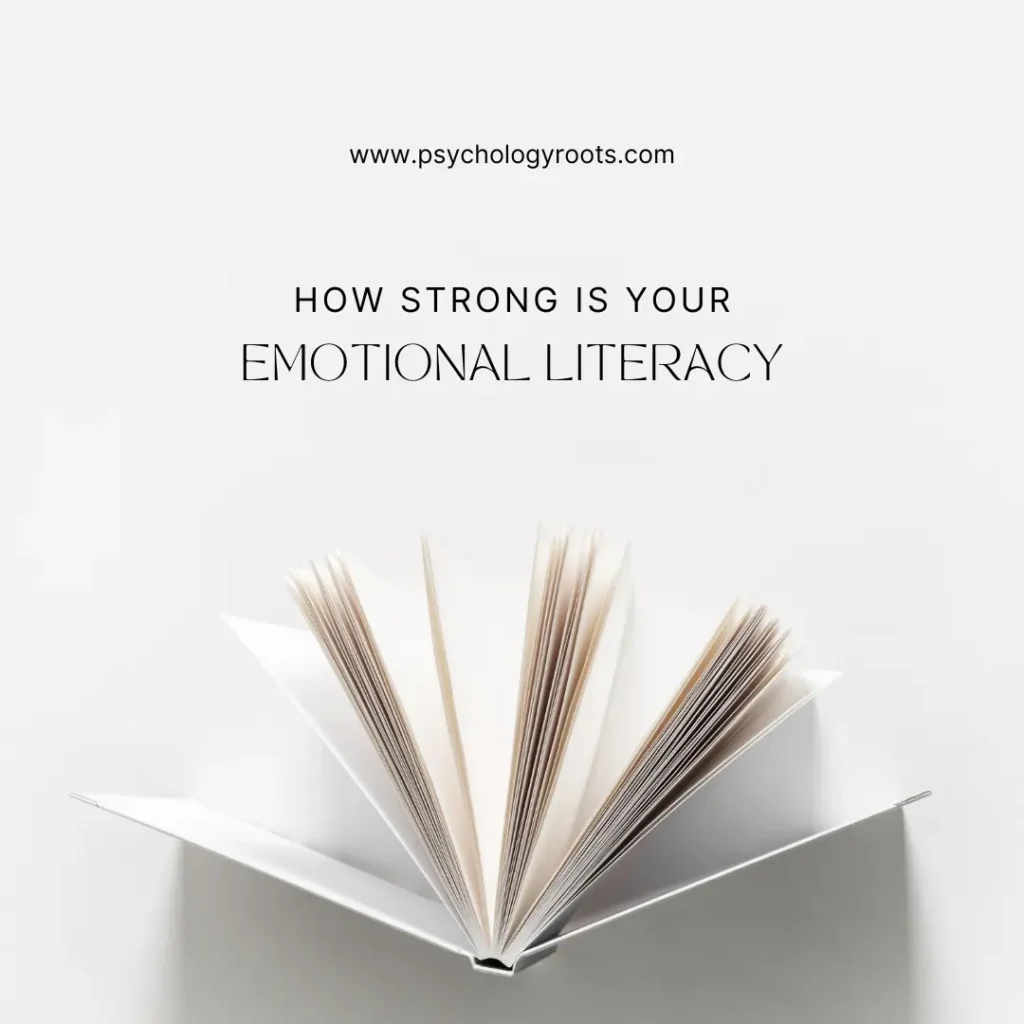Table of Contents
How Strong Is Your Emotional Literacy? Understanding and Improving Your Emotional Skills
Emotional literacy, often referred to as emotional intelligence, is the ability to recognize, understand, express, and manage your emotions effectively. This article explores what emotional literacy is, why it’s important, and how you can assess and improve your own emotional skills.
What is Emotional Literacy?
Emotional Literacy is the capacity to identify and communicate one’s emotions in a healthy way, as well as to understand and empathize with the emotions of others. It encompasses skills such as emotional awareness, expression, regulation, and empathy.

Components of Emotional Literacy:
- Emotional Awareness: Recognizing your emotions as they occur.
- Emotional Expression: Communicating your feelings appropriately.
- Emotional Regulation: Managing your emotions in a way that is healthy and constructive.
- Empathy: Understanding and responding to the emotions of others.
Why is Emotional Literacy Important?
Personal Well-being:
- Mental Health: High emotional literacy is linked to better mental health, as it allows individuals to process their emotions healthily and seek help when needed.
- Stress Management: Those with strong emotional literacy can manage stress more effectively by recognizing and addressing their emotional triggers.
Relationships:
- Communication: Emotional literacy enhances communication in personal and professional relationships by allowing individuals to express their feelings clearly and listen empathetically.
- Conflict Resolution: Understanding and managing emotions can lead to more constructive resolutions in conflicts, reducing misunderstandings and fostering stronger relationships.
Professional Success:
- Leadership: Emotional literacy is a key component of effective leadership, enabling leaders to inspire, motivate, and support their teams.
- Workplace Dynamics: Employees with high emotional literacy contribute to a positive work environment by managing their emotions and responding appropriately to the emotions of others.
How to Assess Your Emotional Literacy
Self-Reflection:
- Recognizing Emotions: Can you easily identify what you’re feeling in different situations?
- Emotional Vocabulary: Do you have the words to accurately describe your emotions, beyond just “happy” or “sad”?
Behavioral Indicators:
- Emotional Response: How do you typically respond to strong emotions? Do you react impulsively, or can you take a moment to process before responding?
- Empathy Level: Are you able to understand and empathize with others’ feelings, even if they differ from your own?
Social Feedback:
- Feedback from Others: What do people close to you say about your emotional interactions? Do they find you understanding and approachable, or distant and difficult to communicate with?
- Conflict Handling: How often do conflicts in your life escalate or get resolved peacefully? This can be a good indicator of your emotional literacy.
Tips to Improve Your Emotional Literacy
Develop Emotional Awareness:
- Mindfulness Practices: Engage in mindfulness exercises to become more aware of your emotions as they arise. Practices like meditation or journaling can help you tune into your feelings.
- Emotional Check-ins: Regularly pause throughout your day to ask yourself how you’re feeling and why. This builds the habit of emotional awareness.
Expand Your Emotional Vocabulary:
- Learn New Words: Increase your emotional vocabulary by learning words that describe a range of emotions. This helps in accurately identifying and expressing your feelings.
- Use Descriptive Language: When discussing your emotions, try to be as descriptive as possible. Instead of saying “I’m upset,” try “I’m frustrated because I felt ignored.”
Practice Emotional Regulation:
- Breathing Techniques: Learn and practice breathing techniques that can help calm your emotions in the moment, allowing you to respond more thoughtfully.
- Delay Responses: When faced with strong emotions, practice waiting a moment before reacting. This gives you time to consider the best course of action.
Enhance Empathy:
- Active Listening: Focus on truly listening when others speak, rather than thinking about your response. This deepens your understanding of their emotions.
- Perspective-Taking: Try to put yourself in others’ shoes, considering their feelings and motivations before reacting. This can lead to more empathetic and compassionate responses.
Conclusion: Building Stronger Emotional Literacy
Emotional literacy is a critical skill for navigating life’s challenges and building strong, healthy relationships. By becoming more aware of your emotions, expanding your emotional vocabulary, practicing regulation, and enhancing empathy, you can strengthen your emotional literacy and improve your overall well-being.